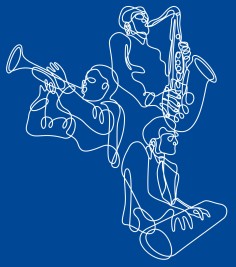Robin Lynam's final Blue Notes column, and his jazz blog to come
After 12 years chronicling the ups and downs of city's jazz scene, and writing a surprising number of obituaries of some of the genre's greats, Lynam shifts to a digital-only format
There's no way to break this gently: Blue Notes has reached the end of the line.
Writing this column and its immediate predecessor, All That's Jazz, during the past 12 years or so has been an unalloyed pleasure and I shall miss it. However, I will still be writing about music for the paper from time to time, and you should soon see me blogging on the SCMP website, covering jazz and blues in Hong Kong.

Throw in the occasional collisions between the worlds of jazz and classical music, and it became clear that All That's Jazz had become a misnomer. When the column migrated to a name change was suggested, and it became Blue Notes.
In its present form, the column has allowed me the luxury of writing about a good 80 per cent of the music I listen to for pleasure, but it also imposed a discipline and obliged me to broaden that listening.
Since the early days of the column, I have met and in some instances corresponded with readers, who have given me useful feedback. I have also made some surprising discoveries, one of which is how much people like to read obituaries.
As a number of prominent jazz and blues musicians have died in the course of this century I have written quite a few of these, but it could have been many more. I have sidestepped several for fear that the column was beginning to look as though it should have a perpetual black border, but more than a few people I have talked to have said that they enjoyed being directed by those career summaries back to music they had half forgotten.
I am indebted to pianist, composer and jazz impresario Allen Youngblood for having been able to keep those obituaries as timely as weekly publication has allowed. He has felt it his duty to call me at odd hours of the day and night to keep me informed of whichever notable musician has just dropped off the perch, and latterly this has become competitive. I have occasionally rushed the bad news to him first.
Locally, the period the column has covered has been an interesting one. The Jazz Club in Lan Kwai Fong closed either before I started writing it, or not long afterwards, bringing to an end what has come to be regarded as something of a golden era of live jazz in Hong Kong.
In terms of opportunities to see international jazz and blues artists in a club setting, it was, but with the exception of Ned Kelly's Last Stand - still keeping the flame burning - The Jazz Club was the only place in town presenting live jazz on a regular basis. In the years since the club's demise the local jazz scene has become much livelier and more diverse. Jazz is an important part of the musical mix at venues such as The Fringe Club, Backstage Live, Peel Fresco, Orange Peel, Grappa's Country, and more.
More young jazz musicians have joined the now veteran Ted Lo and Eugene Pao in making their mark abroad - notably guitarist Teriver Cheung and drummer Nate Wong.
This isn't Tokyo, but we have a vibrant big band jazz scene, and thanks to a small number of entrepreneurially minded concert promoters - first among them Clarence Chang, whose ongoing Jazz World Live Series ensures that there is at least one visiting international jazz artist performing here 10 months of the year - we are much better served for jazz concerts than most other cities in Asia.
For most of the past half century, jazz has been a minority interest, with a much smaller constituency than rock and pop. Jazz fans and musicians tend to be tenacious, however, and it never entirely goes away. So far into the 21st century it is showing no signs of fading away in Hong Kong, and I am optimistic about its future.
I'd like to sign off by saying thank you to my editors and sub-editors at the for the sympathetic treatment my copy has consistently received, and for allowing Blue Notes this long run; to the musicians, here and overseas, for making music worth writing about, and in several cases for their friendship and support; and last but not least to you the reader, whether known to me or not, for your time and attention.
I hope that Blue Notes has, from time to time, nudged you towards some music you might not otherwise have heard, and which you have enjoyed.

